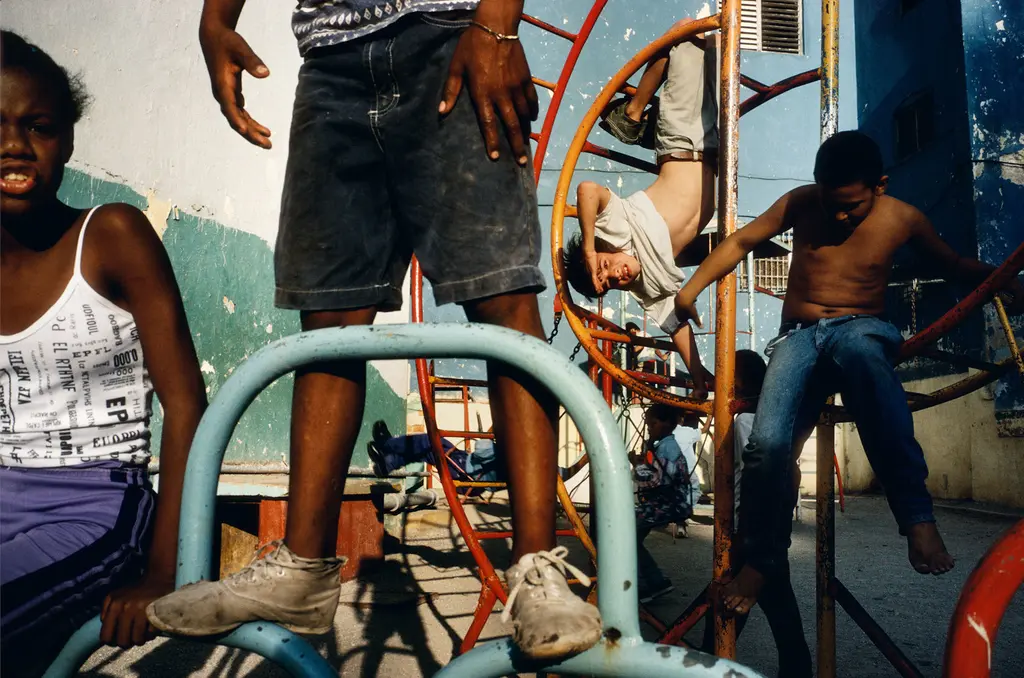Alex Webb’s street scenes capture life at its most poetic
- Text by Alex Webb
- Photography by Alex Webb / Magnum Photos

This article appears in Huck 57 – The Documentary Photo Special IV.
The roots of my photography lie deep in my childhood.
I come from a family immersed in the arts: my mother was a sculptor and draftsman, my brother is a painter and my sister is an ornithological illustrator.
As a child I visited museums regularly with my family and I suspect that those early viewings of de Chirico, Matisse and Braque still affect how I see.

Nicaragua, 1992.

Bombay, 1981.
My father – a publisher, secretive writer and occasional photographer – taught me photographic technique as well as introducing me to a variety of photographic works, including the two photography books that initially inspired me: Henri Cartier-Bresson’s The Decisive Moment and Robert Frank’s The Americans.
From early on, I was project-oriented. In college I produced a series of photographs of teenagers skipping class, following them from the drug store where they hung out to pool halls and bowling alleys.
I also began a series of somewhat alienated and ironic photographs of strip malls north of Boston. But as I worked more in this latter direction, I began to feel that I was reaching a dead end with my work.

Cuba, 1993.

Cuba, 2001.
For some reason, it wasn’t taking me anywhere new. I seemed to be exploring territory that other photographers had already discovered.
I happened to pick up Graham Greene’s novel, The Comedians, a work set in the turbulent world of Papa Doc’s Haiti, and read about a world that fascinated and scared me.
Within months, I was on a plane to Port-au-Prince. That first three-week trip to Haiti transformed me, both as a photographer and as a human.
I photographed a world I had never experienced before, a world of emotional vibrancy and intensity: raw, disjointed, often tragic.

Florida, 1988.

Haiti, 1986.
I began to explore other places – in the Caribbean and especially along the US-Mexico border; places where life seemed to be lived on the stoop and in the street.
Three years after my first trip to Haiti, I realised there was another emotional note that had to be reckoned with.
Searing light and intense colour seemed somehow embedded in the cultures that I had begun working in, so utterly different than the grey-brown reticence of my New England background.

Panama, 2004.

Mexico, 1996.
Ever since then, I’ve worked predominantly in colour. Whatever insights – sociopolitical, cultural or aesthetic – I may have into the societies I have photographed come not from preconception, but from the process of wandering the street.
At times, I feel the street can act as a kind of bellwether, hinting at sociopolitical changes to come.
Over the years, my way of seeing in colour has expanded into various projects, leading me to places of cultural and often political uncertainty – borders, islands, edges of societies – where cultures merge, sometimes clashing, sometimes fusing.

Brazil, 1993.

Zaire, 1982.
Between 1986 and 2007 I produced eight books that reflect this ongoing obsession. Since 2009, I have completed three collaborative books with my wife and creative partner, the photographer Rebecca Norris Webb.
One of them, Memory City, is about Rochester, New York – the long-time home of Kodak – one year after the company declared bankruptcy. It’s also a kind of meditation on film, time and memory.
This book is the first in a series of projects – both individual and collaborative with Rebecca – in the US that I expect to work on over the next years.
Yet even there, my interest in borders and edges remains, as I find myself examining places where cultures merge and fuse, with North American cities being transformed by the arrival of new immigrants.
In some sense, in many US cities, borders are everywhere. Maybe, after wandering the world for some 35 years, I am finally ready to confront my own culture with the camera.
La Calle, photographs by Alex Webb from Mexico, 1975-2007, is published by Aperture. Check out this portfolio at Magnum Photos.
This article appears in Huck 57 – The Documentary Photo Special IV. Subscribe today so you never miss another issue.
Enjoyed this article? Like Huck on Facebook or follow us on Twitter.
You might like

In Medellín’s alleys and side streets, football’s founding spirit shines
Street Spirit — Granted two weeks of unfettered access, photographer Tom Ringsby captures the warmth and DIY essence of the Colombian city’s grassroots street football scene.
Written by: Isaac Muk

Remembering New York’s ’90s gay scene via its vibrant nightclub flyers
Getting In — After coming out in his 20s, David Kennerley became a fixture on the city’s queer scene, while pocketing invites that he picked up along the way. His latest book dives into his rich archive.
Written by: Miss Rosen

On Alexander Skarsgård’s trousers, The Rehearsal, and the importance of weirdos
Freaks and Finances — In the May edition of our monthly culture newsletter, columnist Emma Garland reflects on the Swedish actor’s Cannes look, Nathan Fielder’s wild ambition, and Jafaican.
Written by: Emma Garland

Why Katy Perry’s space flight was one giant flop for mankind
Galactic girlbossing — In a widely-panned, 11-minute trip to the edge of the earth’s atmosphere, the ‘Women’s World’ singer joined an all-female space crew in an expensive vanity advert for Jeff Bezos’ Blue Origin. Newsletter columnist Emma Garland explains its apocalypse indicating signs.
Written by: Emma Garland

Katie Goh: “I want people to engage with the politics of oranges”
Foreign Fruit — In her new book, the Edinburgh-based writer traces her personal history through the citrus fruit’s global spread, from a village in China to Californian groves. Angela Hui caught up with her to find out more.
Written by: Angela Hui

We are all Mia Khalifa
How humour, therapy and community help Huck's latest cover star control her narrative.
Written by: Alya Mooro

